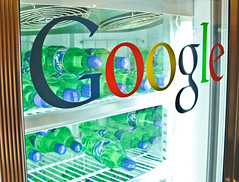
Late last year, LinkedIn released the Talent Brand Index, along with a list of the most "InDemand" employers. According to this whitepaper, The Talent Brand index ranks each company by the number of people interested in engaging with the company (researching your company and career pages, following your company, and viewing your jobs and applying), divided by the number of people who are aware of your company as an employer (by viewing company profiles, and being connected to your employees).
This matters to employers competing for top talent in a competitive industry, because if you have a strong Talent Brand, it's easier to attract and retain top talent.
As you might expect, Google's one of the stand-outs. Google is ranked #1 overall in all geographies and functions; as well as being ranked:
Geographically:
- #1 in the United States
- #1 in the United Kingdom
- #2 in Canada
- #2 in Australia
- #3 in France
- #10 in India
- not in the top 20 in Brazil
- not in the top 20 in the Netherlands
By Industry:
- #1 in Software Engineering;
- #1 in Marketing;
- #1 amongst students & recent graduates; and
- #10 in Finance and Accounting
To me, the most impressive statistic here is this last one - Google has a talent brand in the top 10 for a very competitive industry that's not its' core business.
Google are renowned for some of their incredible perks, but they're also a very data-driven organization, including in HR. They don't give people free food and valet parking without crunching the data to know that those things work for their organisation. Laszlo Bock is the SVP of People Operations at Google, and in this interview, explains that all of the perks Google offers its' employees achieve one or more of the following:
- Creating a Community;
- Driving Innovation; and/or
- Driving Efficiency.
More importantly, he feels that the company would be the same without the perks, because people don't want to work for Google because of the perks - they want to work there because of the culture.
And how do Google gauge which programs will appeal to their employees and which ones won't? They ask them.
Some things to consider for employers:
- If you're not already thinking about Talent Brand, you should.
- Your talent brand is not the same as your company brand, because the workforce you're competing for is not the consumer you're competing for.
- Ensure all your talent management strategies align to business objectives, and you can clearly articulate their benefit - even better if you can use workforce analytics to demonstrate their benefit.
- Ensure that the "benefits" you offer employees will actually attract and retain top employees; and
- Point 4 is much easier if you actually gauge what your employees and potential employees want, rather than relying on "best practice".
Related articles
- Employer Brand Playbook - sneak preview (slideshare.net)
- Inside Google's Culture of Success and Employee Happiness (kissmetrics.com)

